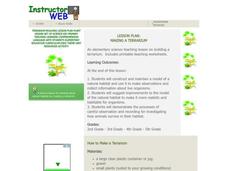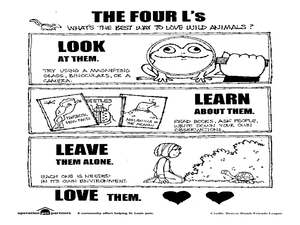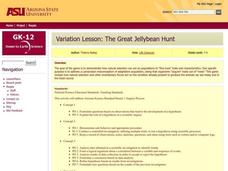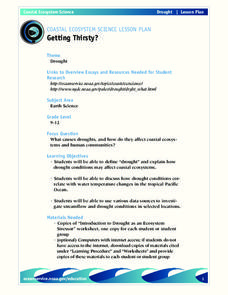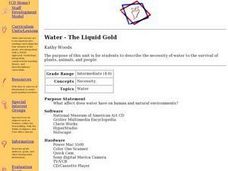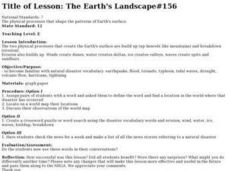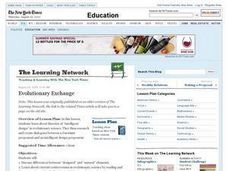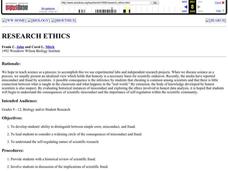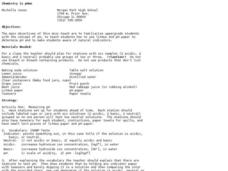EngageNY
Relationships Between Key Scientific Concepts: Planning What Causes Earthquakes
That is ground shaking news! Scholars read Earthquake in multiple reads to determine the gist, identify cause and effect relationships, and understand vocabulary. Learners complete graphic organizers to describe what happens before and...
Curated OER
Wilderness
Students examine the dynamic between animals and humans in the wilderness. They work together in groups share their journal entries when asked to reflect on natural areas.
Curated OER
Making a Terrarium
Students construct and maintain model of natural habitat, suggest improvements to the model of the natural habitat to make it more realistic and habitable, and demonstrate careful observation and recording of how animals survive in their...
Curated OER
Water Cycle and Its Movement in the Soil
Students are introduced to the water cycle and water movement in soil. In this water cycle instructional activity, students explore how water moves through the water cycle and discuss water sources, natural...
Curated OER
Wonderfully Wild Unit the four L's of Wildlife
Students appreciate the natural environment. In this "four L's" lesson, students observe, reflect and appreciate unique ecosystems and how they help sustain life. Students create posters with the four L's.
Curated OER
Carnival of Carnivores
Students research different species of meat-eating animals in their natural environments to create a Carnival of Carnivores exhibit for their classroom.
Curated OER
Caterpillars To Butterflies
Students observe the life cycle of a butterfly. They read butterfly/caterpillar themed books. They sequence the lifecycle from eggs on a leaf to an adult butterfly. They release their butterflies into a natural habitat after singing and...
Curated OER
The Great Jellybean Hunt
Students explore natural selection and its influence on the populations to fine tune traits and characteristics. The acquisition of traits developed out of need is examined through a game played in class.
Curated OER
Myth-try Cards Activity
Students read creation myths to learn various cultural explanations for natural phenomena. They select sharks and write myths to explain physical structures, behaviors or roles in ecosystems. They research the animals to provide...
Curated OER
Getting Thirsty?
Students explore the concept of drought and its significance as a natural hazard. In this drought lesson plan, students complete 13 questions on an "Introduction to Drought as an Ecosystem Stressor" worksheet and discuss the responses as...
Curated OER
Water-The Liquid Gold
Learners investigate the necessity of water for the survival of plants, animals, and people. They explore the affect that water has on human and natural environments through literature, field trips, and discussions.
Curated OER
Magnets
Students demonstrate the process of science by posing questions and investigating phenomena through language, methods and instruments of science as they experiment at four teacher-created stations to explain the fundamentals of magnetism.
Curated OER
Winter
Learners explore the nature of water and water molecules. They examine the role of ice on organisms.
Curated OER
Our Savage Planet in the News
Students research volcanoes, storms, atmospheric conditions and extreme environments. They collect information and create a simulation of a science newscast. They watch a video and write a letter as an eyewitness to an avalanche.
Curated OER
The Earth's Landscape#156
Students define a word from the natural disaster list, find a location in the world where this type of disaster has occurred and discuss what they have identified. They design a crossword puzzle of natural disaster words or check a...
Curated OER
Evolutionary Exchange
Students discuss the difference between designed and natural elements. After reading an article, they discover information about current controversies in evolutionary science. In groups, they research and write dialogues between two...
Curated OER
Shades of Gray
Students examine their own strengths and weaknesses and try to determine if it is a result of nature, nuture or both. After reading an article, they discuss how gender may or may not account for differences in intelligence. They...
Curated OER
Research Ethics
Learners develop an ability to distinguish between simple error, misconduct and fraud. Students are lead to consider a widening circle of the consequences of misconduct and fraud. They expand their knowledge on the self-regulating...
Curated OER
"ART ZOO 'Blacks in the Westward Movement', 'What Can You Do with a Portrait', and 'Of Beetles, Worms, and Leaves of Grass'"
Learners study black history, examine portraits and portrait making and create their own portraits, and investigate their natural environment. This humanities lesson provides a text that can be used to teach lessons in black...
Curated OER
Get to Know Glass
Students learn about the properties of glass. In this making and molding glass lesson, students participate in an experiment where they will learn how glass is created and how it is shaped to create bottles and jars. Students also...
Curated OER
Round and Round-The Water Cycle
Students explore the water cycle. In this earth science lesson, students work in small groups to read various books on the water cycle and take notes on chart paper. Students share their notes and teach a younger audience what they have...
Curated OER
Lesson 12: Ho'olaulima: Let's Make a Hawaiian Garden
Second graders grow a classroom garden that acts as a living laboratory for cross-curricular activities. In this classroom garden lesson, 2nd graders follow directions to build and plant a garden that is used to teach math, science, and...
Curated OER
Chemistry is pHun
Students investigate the pH of solutions and they learn how to use different types of indicators. In this pH lesson plan, students test various solutions with pH paper and determine if they are acidic, basic or neutral. They also test...
Curated OER
Ant Farm
Young scholars explore the value of insects in the natural world. In this insect activity, students examine species of insects, collect and record data, and analyze the data.




